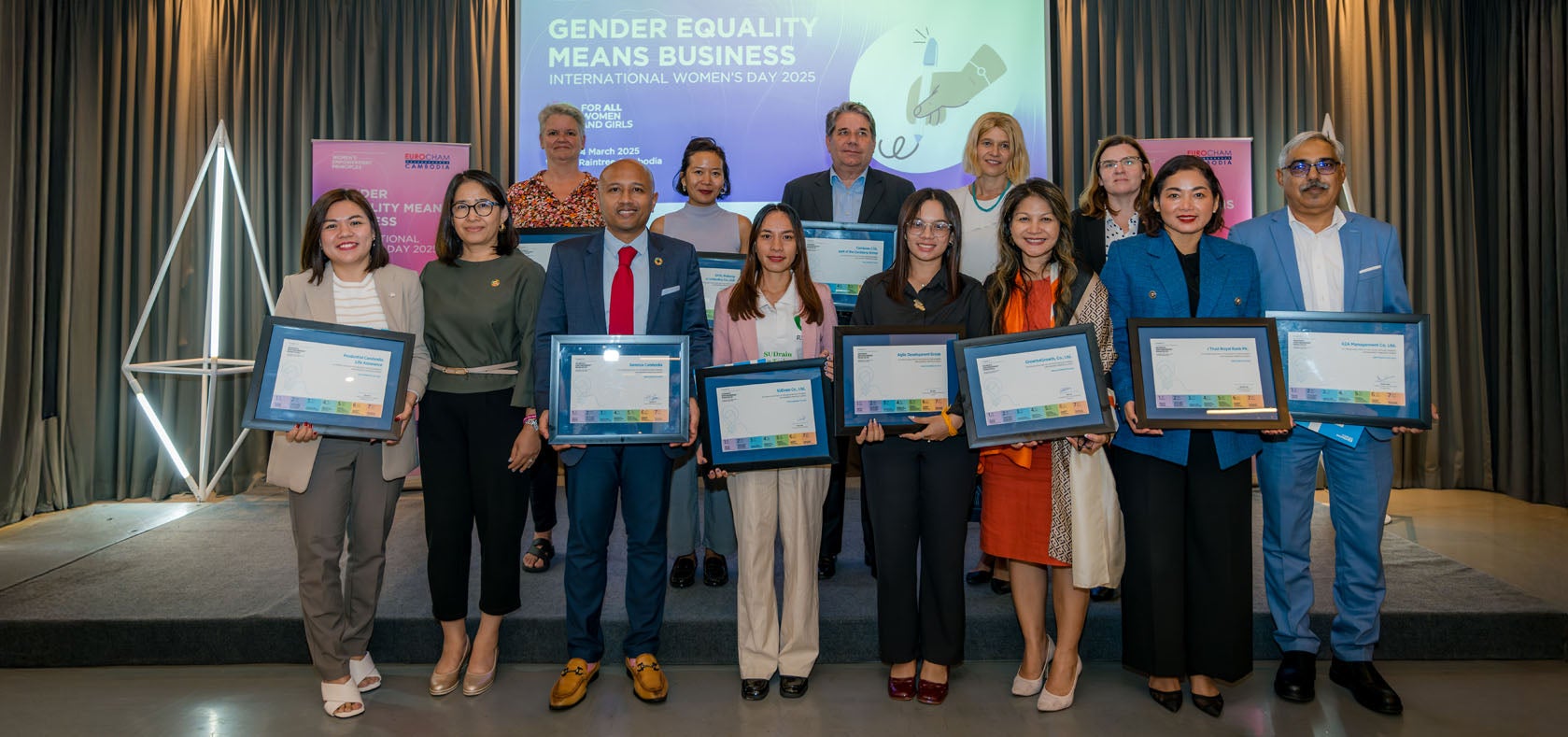Gender Equality Means Business: Cambodian CEOs Commit to Change
Date:

Phnom Penh, Cambodia — UN Women and the European Chamber of Commerce in Cambodia (EuroCham) convened business leaders for the International Women’s Day Business Engagement Event, themed “Gender Equality Means Business,” at Raintree in Phnom Penh, with support from the Australian Government. The event aimed to foster collaboration and promote concrete actions for gender equality within the Cambodian business sector, focusing on the Women’s Empowerment Principles (WEPs).
Cambodian women are vital to the nation's economic growth, with 84.1 per cent participating in the workforce. As business leaders, they own 62 per cent of micro-enterprises and 26 per cent of small and medium-sized enterprises (SMEs). However, they continue to face structural barriers, including unequal pay, limited access to credit and social protection, and underrepresentation in leadership. Additionally, women shoulder 90 per cent of unpaid domestic and caregiving responsibilities, hindering their full economic participation.
The event featured discussions on the business case for gender equality, emphasising the economic benefits of inclusive practices. Emerald Am, Chairman of Benelux Cambodia, an organisation representing the Belgian, Dutch, and Luxembourg business communities active in Cambodia, stated, “At our organisation, gender equality is a fundamental pillar. It’s not just about doing what’s right—it’s also smart for business. Creating gender equality means providing a fair and level playing field for everyone.” Julie Keo, Vice-Chair of Eurocham, stressed the economic imperative of inclusion, adding, “Gender equality is an economic imperative. If we want an economy that is resilient and productive, we must include everyone rather than focusing on just one gender.”
Central to the event was the ceremonial signing of commitments to the Women’s Empowerment Principles (WEPs) by twelve CEOs. Developed by UN Women and the UN Global Compact, the WEPs provide seven guiding principles for businesses seeking to advance gender equality, and are grounded in the recognition that business has a stake in and responsibility for gender equality and women's empowerment. Thary Vorn, CEO of SUDrain, an innovative wastewater solutions company, explained the company’s decision to adopt the WEPs: “For us at SUDrain, WEPs align closely with our mission. Since our founding, we’ve understood the value of promoting women—not just within our company but also in the wider community. WEPs provide a strong platform that connects and supports us, helping us collaborate and drive meaningful change.”

By committing to the WEPs, these CEOs pledged to establish equitable workplaces through equal pay, gender-responsive supply chains, and zero tolerance for harassment. Emerald Am observed, “Gender equality means business—that’s the key message today. To me, it means giving everyone a fair chance, whether they are women, from different backgrounds, or otherwise. It’s about eliminating social and gender biases so that everyone can contribute equally.”
Thary Vorn added, “I want to encourage more entrepreneurs to sign the WEPs. When women lead organisations, they create real ecosystems of support, helping other women become independent and brave enough to raise their voices. WEPs provide an excellent platform for this.”
WEPs signatories have an opportunity to participate in the newly launched Gender Action Lab (GAL), an initiative powered by the Women’s Empowerment Principles to foster private sector innovations that advance gender equality and women’s empowerment. Cambodia is one of four countries (along with Malaysia, Indonesia, and the Philippines) to implement this platform. The GAL engages businesses and partners through an action-learning process to co-create, test, and scale transformative solutions aligned with the WEPs.
For many, participating in the WEPs is a commitment beyond profit—an investment in a more prosperous and equitable Cambodia. As Thary Vorn said, “When women lead, it strengthens the economy and benefits the entire community. Empowering women creates real economic growth, and when a woman becomes a leader, she can support and inspire others to lead as well, helping to build a stronger Cambodia.”
For more information on the Women’s Empowerment Principles, please visit: https://www.weps.org/
